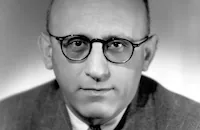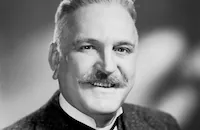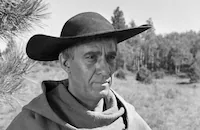The Great Sinner

Brief Synopsis
Cast & Crew
Robert Siodmak
Gregory Peck
Ava Gardner
Melvyn Douglas
Walter Huston
Ethel Barrymore
Film Details
Technical Specs

Synopsis
In the famous casino resort town of Wiesbaden, Germany, during the wild, decadent days of the 1860s, young Pauline Ostrovsky, a reformed gambling addict, watches over Fedja, a talented writer whose obsessive love for her and his near-ruination from gambling has resulted in physical collapse. As Pauline reads from the pages of Fedja's most recent manuscript, she is reminded of the time when she first met the handsome writer: Traveling on the Moscow to Paris train, Pauline and Fedja, seated opposite each other, exchange glances in silence until the train arrives in Wiesbaden, where Pauline breaks the silence by coyly suggesting that Fedja follow her. Fedja follows Pauline into the gambling casino, and soon discovers that she, like her father, General Ostrovsky, is a gambling addict. Fedja begins to understand the full extent of the Ostrovskys' gambling illness when he sees both the General and Pauline take pleasure in the news that the General's rich mother is dying, and immediately gamble away the fortunes they expect to inherit. Though repulsed by the world of gambling, Fedja decides to stay in Wiesbaden to undertake a character study of those who thrive on casino life. One such person is the tragically compulsive gambler and thief Aristide Pitard, who steals Fedja's bet and loses all his money at the roulette table. Fedja takes pity on Aristide and gives him enough money to leave Wiesbaden, but Aristide instead uses the money to continue gambling. After losing once more, Aristide shoots himself in desperation, and on his deathbed asks Fedja to return a religious medal that he stole from a young woman. However, Aristide dies before he names the woman from whom he stole the medal. Fedja later discovers that the medal belonged to Pauline when he sees that she is the only person other than himself at Aristide's funeral service. In time, Fedja falls in love with Pauline, to whom he returns the medal, only to discover that the General has arranged Pauline's marriage to Armand De Glasse, the casino's ruthless manager, as a substitute for payment on his enormous gambling debt to Armand. Hoping to win Pauline back, Fedja decides to win enough money to pay the General's debt himself, and begins by betting his life savings at the roulette table. By the time Fedja wins more than he needs to pay the General's debt, he is obsessed with on gambling and continues his betting in a maniacal fashion. Eventually, Fedja's luck runs out, and though he loses everything, he continues to gamble with money he borrows from Armand. After putting up all his writings as security, Fedja, increasingly desperate for money, pawns his last remaining possessions. Fedja, now completely broke, becomes delirious and has a vision in which Aristide hands him a gun to shoot himself. While Pauline tries to help Fedja, he rips the medal off her neck and tries to sell it at the pawnshop. The pawnbroker, Emma Getzel, refuses to take the medal, and Fedja nearly kills her until he collapses and loses consciousness. Pauline's recollection of events in the past comes to a close when she discovers that Fedja has completed his manuscript about the world of gambling and can now pay his debts. Pauline then reassures Fedja that he has not written the last chapter in their story and forgives him.

Director

Robert Siodmak
Cast

Gregory Peck

Ava Gardner

Melvyn Douglas

Walter Huston

Ethel Barrymore

Frank Morgan

Agnes Moorehead
Frederick Ledebur
Ludwig Donath

Curt Bois

Ludwig Stossel
Erno Verebes

Martin Garralaga
Antonio Filauri
Jean Del Val
John Arnold
Sayre Deering
Perry Ivins
Vincent Renno
Wheaton Chambers
Thomas Ingersoll
Peter Scott
Erica Strong
Martha Bamattre
Lester Sharpe
John Cortay
Dick Bartell
Everett Glass
Frank Jacquet
Neal Dowd
Eloise Hardt
William Stelling
Holger Bendixen
Dick Simmons
Irene Seidner
Fred Lorenz
Hans Hopf
Marianne Budrow
Lotte Stein

Ken Tobey
Walter Rode
June Booth
Max Willenz
Manfred Furst
Betty Jane Howarth
William Hawes
Andre Charlot
Sam Scar
Elsa Heims
Joan Miller
John Piffle
Emil Rameau
Elspeth Dudgeon
James Anderson
Charles Wagenheim
Gisela Werbisek
Hanne Axman
Lorraine Crawford
Ann Sturgis

Leonid Kinskey
Ilka Gruning
Fred Nurney
Bert Hanlon
David Mcmahon
Bob Stevenson
Daniel De Jonghe
Michael Macey
Joe Ploski
Victor Desny
Sue Casey
Frank Elliott
Lisa Golm
Jeraldine Jordan
George Paris
Crew
Jack Dawn
Paul Elbogen
Ladislas Fodor
Ladislas Fodor
George Folsey
René Fülöp-miller
Cedric Gibbons
Henry W. Grace
Sydney Guilaroff
Irene
Christopher Isherwood
Bronislau Kaper
Harold F. Kress
Warren Newcombe
Hans Peters
André Previn
Gottfried Reinhardt
Douglas Shearer
Marvin Stuart
Valles
Edwin B. Willis

Photo Collections
Videos
Movie Clip




Trailer
Hosted Intro
Film Details
Technical Specs

Articles
The Great Sinner
Peck had made his film debut just five years earlier, and had already been nominated three times for an Oscar® (he would be nominated again for another film released in 1949, Twelve O'Clock High). One of Hollywood's fastest-rising young stars, Peck had refused to sign an exclusive contract with any one studio, much to the chagrin of MGM's Louis B. Mayer, who reportedly resorted to tears while begging Peck to sign on with MGM. Ava Gardner was also a rising star, after a long apprenticeship at MGM that began in 1941. The Killers (1946), which she made on loanout to Universal, got her noticed, and won her bigger roles at her home studio. The Great Sinner was the first of three films Peck and Gardner made together. They became great friends, and Peck later said that in spite of the fact that Gardner constantly disparaged her acting talent, he thought she was a very good actress who had the potential to be a great one.
The Great Sinner marked a reunion for Gardner and director Robert Siodmak, who had directed her in The Killers. Raised in Germany, Siodmak worked in German and French films before joining the flood of European émigrés in Hollywood in 1940. Since The Great Sinner is set in the German spa resort city of Wiesbaden, Siodmak and fellow émigré producer Gottfried Reinhardt (son of director Max Reinhardt) cast several European refugees in bit parts in the film. Peck remembered Siodmak as "an absolute nervous wreck" while working on The Great Sinner, overwhelmed with the responsibility of this "important" picture, and with a nurse constantly in attendance, giving him injections.
Siodmak was also working for a second time with Ethel Barrymore, whom he had directed in The Spiral Staircase (1946). The Great Sinner was Barrymore's first film under her new MGM contract. The grande dame of the American theater has a brief but impressive role in the film, as Walter Huston's mother, although she was only five years older than Huston. In spite of her pedigree, Barrymore had an earthy side, and enjoyed talking baseball and boxing with fellow fans Peck and Huston. Although Peck enjoyed those conversations, he was in awe of Huston and tried to draw him out about the craft of acting. Huston had little patience with such talk, and when Peck asked what advice he'd give to a young actor like himself, Huston replied, "Give 'em a good show and always travel first class."
As noted by the critics, The Great Sinner had first-class production values, but it was far from a successful film. Howard Barnes in the New York Herald Tribune called it "pompous and dull entertainment." Time Magazine had praise for supporting players Barrymore, Frank Morgan, and Agnes Moorehead, but added, "the rich, exuberant flow of dialogue, incident, and atmosphere characteristic of the Russian master has been choked to a pedestrian trickle. Dostoevsky's brilliant insights into the tortured motives and emotions of his lovers have paled into klieg-lighted stereotypes."
Novelist Christopher Isherwood, who worked on the screenplay, felt The Great Sinner was a missed opportunity. "It should have been much better than it was....but apart from a few good scenes, it was neither Dostoevsky's story, nor the story of Dostoevsky." The public, less literary than Isherwood, was completely uninterested, and stayed away. Seen today, however, The Great Sinner may not be faithful to Dostoevsky, but it is high-gloss MGM, with some excellent performances that make it well worth watching.
Director: Robert Siodmak
Producer: Gottfried Reinhardt
Screenplay: Ladislas Fodor, Christopher Isherwood, based on a story by Fodor, Rene Fulop-Miller
Cinematography: George Folsey
Editor: Harold F. Kress
Costume Design: Irene, Valles
Art Direction: Cedric Gibbons, Hans Peters
Music: Bronislau Kaper
Cast: Gregory Peck (Fedja), Ava Gardner (Pauline Ostrovsky), Melvyn Douglas (Armand LeGlasse), Walter Huston (General Ostrovsky), Ethel Barrymore (Granny), Frank Morgan (Aristide Pitard), Agnes Moorehead (Emma Getzel).
BW-110m. Closed captioning.
by Margarita Landazuri

The Great Sinner
Kenneth Tobey (1917-2003)
Born in Oakland, California on March 23, 1917, Tobey originally intended to be a lawyer before a stint with the University of California Little Theater changed his mind. From there, he went straight to New York and spent nearly two years studying acting at the Neighborhood Playhouse, where his classmates included Gregory Peck, Eli Wallach and Tony Randall. Throughout the '40s, Tobey acted on Broadway and in stock before relocating to Hollywood. Once there, Tobey soon found himself playing a tough soldier in films like I Was a Male War Bride and Twelve O' Clock High (both 1949); or a tough police officer in Kiss Tomorrow Goodbye and Three Secrets (both 1950). Such roles were hardly surprising, given Tobey's craggy features, unsmiling countenance and rough voice.
Needless to say, no-nonsense, authority figures would be Tobey's calling for the remainder of his career; yet given the right role, he had the talent to make it memorable: the smart, likeable Captain Hendrey in The Thing From Another World (1951); the gallant Colonel Jack Evans in the "prehistoric dinosaur attacks an urban center" genre chiller The Beast from 20,000 Fathoms (1953, a must-see film for fans of special effects wizard, Ray Harryhausen; and as Bat Masterson, holding his own against Kirk Douglas and Burt Lancaster in Gunfight at the O.K. Corral (1957).
Television would also offer Tobey much work: he had his own action series as chopper pilot Chuck Martin in Whirlybirds (1957-59); and had a recurring role as Assistant District Attorney Alvin in Perry Mason (1957-66). He would also be kept busy with guest appearances in countless westerns (Gunsmoke, Bonanza, The Virginian) and cop shows (The Rockford Files, Barnaby Jones, Ironside) for the next two decades. Most amusingly, the tail end of Tobey's career saw some self-deprecating cameo spots in such contemporary shockers as The Howling (1981); Strange Invaders (1983) and his role reprisal of Captain Hendry in The Attack of the B-Movie Monsters (2002). Tobey is survived by a daughter, two stepchildren, and two grandchildren.
by Michael T. Toole
Kenneth Tobey (1917-2003)
Quotes
Trivia
Notes
A working title for this film was The Gamblers. Although not noted in the onscreen credits, this film is based on the novella The Gambler by Fyodor Mikhailovich Dostoevsky. Dostoevsky is referred to indirectly in the film's prologue, which states that "the story is inspired by the work of a great writer, a gambler himself, who played for his life and won immortality." Noting the absence of a credit for Dostoevsky, the Hollywood Reporter reveiewer wrote that "somewhere down the line Dostoevsky...seems to have been given the brushoff by the producers." Although the film lists "Fedja" as the name of the character played by Gregory Peck, M-G-M studio publicity material and the CBCS refer to the character as "Fodor Dostoievsky."
Modern sources draw many parallels between the fictional character of "Fedja" and the life of Dostoevsky. A May 1940 Hollywood Reporter news item indicates that Warner Bros. planned to film a version of The Gambler starring Albert Basserman and directed by William Dietrle, but that film was never made. A May 1948 Los Angeles Examiner news item noted that Lana Turner was originally set to star opposite Gregory Peck. According to Melvyn Douglas' autobiography, he initially rejected his assignment to this film as his last under his M-G-M contract, and only agreed to do it as a personal favor for M-G-M production head Dore Schary. The Great Sinner received mostly unfavorable reviews when it was released, and a biography of Ava Gardner notes that Robert Siodmak was so disappointed with the film that he later refused to admit that he had directed it. Dostoevsky's novella was the basis or inspiration for many foreign-made films, as well as Paramount's 1974 film The Gambler, directed by Karel Reisz and starring James Caan, Paul Sorvino and Lauren Hutton.
















